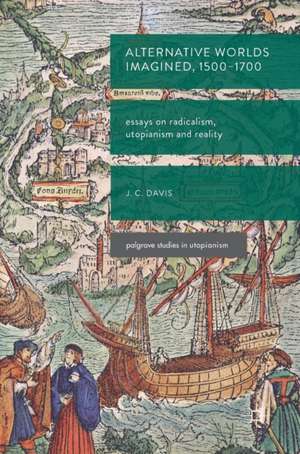Alternative Worlds Imagined, 1500-1700: Essays on Radicalism, Utopianism and Reality: Palgrave Studies in Utopianism
Autor James Colin Davisen Limba Engleză Hardback – 22 sep 2017
This book address the relationship between utopian and radical thought, particularly in the early modern period, and puts forward alternatives approaches to imagined ‘realities’. Alternative Worlds Imagined, 1500-1700 explores the nature and meaning of radicalism in a traditional society; the necessity of fiction both in rejecting and constructing the status quo; and the circumstances in which radical and utopian fictions appear to become imperative. In particular, it closely examines non-violence in Gerrard Winstanley’s thought; millennialism and utopianism as mutual critiques; form and substance in early modern utopianism/radicalism; Thomas More’s utopian theatre of interests; and James Harrington and the political necessity of narrative fiction. This detailed analysis underpins observations about the longer term historical significance and meaning of both radicalism and utopianism.
| Toate formatele și edițiile | Preț | Express |
|---|---|---|
| Paperback (1) | 579.99 lei 43-57 zile | |
| Springer International Publishing – 18 mai 2018 | 579.99 lei 43-57 zile | |
| Hardback (1) | 585.40 lei 43-57 zile | |
| Springer International Publishing – 22 sep 2017 | 585.40 lei 43-57 zile |
Preț: 585.40 lei
Preț vechi: 688.71 lei
-15% Nou
Puncte Express: 878
Preț estimativ în valută:
112.02€ • 117.25$ • 93.23£
112.02€ • 117.25$ • 93.23£
Carte tipărită la comandă
Livrare economică 31 martie-14 aprilie
Preluare comenzi: 021 569.72.76
Specificații
ISBN-13: 9783319622316
ISBN-10: 3319622315
Pagini: 246
Ilustrații: VIII, 246 p.
Dimensiuni: 148 x 210 mm
Greutate: 0.46 kg
Ediția:1st ed. 2017
Editura: Springer International Publishing
Colecția Palgrave Macmillan
Seria Palgrave Studies in Utopianism
Locul publicării:Cham, Switzerland
ISBN-10: 3319622315
Pagini: 246
Ilustrații: VIII, 246 p.
Dimensiuni: 148 x 210 mm
Greutate: 0.46 kg
Ediția:1st ed. 2017
Editura: Springer International Publishing
Colecția Palgrave Macmillan
Seria Palgrave Studies in Utopianism
Locul publicării:Cham, Switzerland
Cuprins
1. Introduction.- 2. Radicalism in a traditional society: The valuation of radical thought in the English Commonwealth, 1649-1660.- 3. Afterword: Reassessing radicalism in a traditional society: two questions.- 4. Conquering the Conquest: the limits of non-violence in Gerrard Winstanley’s thought’.- 5. Formal Utopia/Informal Millennium: the struggle between form and substance as a context for seventeenth-century utopianism.- 6. Against Formality: one aspect of the English Revolution.- 7. Religion and the struggle for freedom in the English Revolution.- 8. Thomas More’s Utopia: sources, legacy and interpretation.- 9. Goodbye to Utopia: Thomas More’s Utopian conclusion.- 10. James Harrington’s utopian radicalism and the narration of an alternative world.- 11. Conclusion.
Notă biografică
J. C. Davis is Emeritus Professor of History at the University of East Anglia, UK. His previous publications include Utopia and the Ideal Society (1981), Fear, Myth and History (1986), Oliver Cromwell (2001) and numerous essays on the history of utopian and radical thought. He is currently co-editing Textual Moments in the History of Political Thought (2018) with John Morrow.
Textul de pe ultima copertă
This book address the relationship between utopian and radical thought, particularly in the early modern period, and puts forward alternatives approaches to imagined ‘realities’. Alternative Worlds Imagined, 1500-1700 explores the nature and meaning of radicalism in a traditional society; the necessity of fiction both in rejecting and constructing the status quo; and the circumstances in which radical and utopian fictions appear to become imperative. In particular, it closely examines non-violence in Gerrard Winstanley’s thought; millennialism and utopianism as mutual critiques; form and substance in early modern utopianism/radicalism; Thomas More’s utopian theatre of interests; and James Harrington and the political necessity of narrative fiction. This detailed analysis underpins observations about the longer term historical significance and meaning of both radicalism and utopianism.
Caracteristici
Explores the history and development of utopian thought from Thomas More onwards, focusing particularly on the early modern period Examines the linguistic, social, cultural and material dimensions of subversive thinking in this period Demonstrates that both radical and utopian thought share narrative fictional qualities Includes supplementary material: sn.pub/extras













